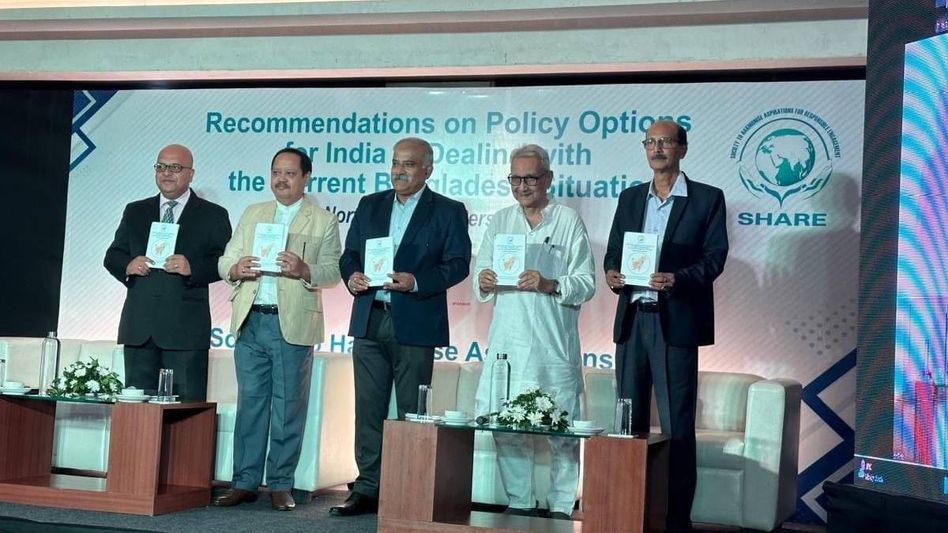Assam: Northeast think tank offers policy recommendations for India on Bangladesh crisis
The meeting was held in Guwahati on August 18 and it discussed recommendations to look into India's response to the current crisis Bangladesh while considering the Northeast's perspective.
 Assam: Northeast think tank offers policy recommendations for India on Bangladesh crisis
Assam: Northeast think tank offers policy recommendations for India on Bangladesh crisisFollowing the ousting of Bangladesh Prime Minister Sheikh Hasina who fled the country on August 5, 2024, the Society to Harmonise Aspirations for Responsible Engagement (SHARE), a think tank dedicated to Northeast India concerns has proposed a series of policy recommendations for India.
SHARE has seasoned Bangladesh and NEI experts including our Chairperson, Radha Krishna Mathur, Harsh Vardhan Shringla, Bhaskar Jyoti Mahanta, Lt. Gen. Rana Pratap Kalita (retd.), Nazeeb Arif, Dr. Samudra Gupta Kashyap, Subimal Bhattacharjee, among others. While Mathur has served the Government of Tripura for over 15 years and was the Chief Secy. of Tripura before taking up positions in New Delhi, Shringla is one of the most liked Indian High Commissioners to Bangladesh. Mahanta, as the Director General of Police (HoPF) of Assam and Lt. Gen. Kalita as the GoC-in-C, Eastern Command have been close observers of Bangladesh’s ties with NEI throughout their careers. Similarly, Arif has been engaged in sub-regional economic relations with Bangladesh as the former Secretary General and CEO of Indian Chamber of Commerce. Dr. Kashyap is the author of one of the most significant books on Northeast India-Bangladesh relationship and Bhattacharjee is a renowned Bangladesh watcher.
The meeting was held in Guwahati on August 18 and it discussed recommendations to look into India's response to the current crisis Bangladesh while considering the Northeast's perspective.
In Bangladesh, a revolution started by students led to the downfall of Prime Minister Sheikh Hasina government which had been in power for 15 years. It began as a protest against a quota system and evolved into a nationwide movement that forced Sheikh Hasina to flee her own country and take asylum in India. As Hasina fled the country, the parliament was dissolved and an interim government led by Nobel laureate Muhammad Yunus was formed.
There is instability in Bangladesh with the current interim goevrnment ruling the country. The think tank's recommendations comes as Bangladesh under Muhammad Yunus is managing the country foreign affairs.
The think tank discussed the need need for India to mobilize international support for Bangladesh’s interim government. Despite the challenges faced by the interim administration, India should use its influence to encourage cooperation among Bangladeshi stakeholders, including opposition parties like the Bangladesh Nationalist Party (BNP). This is crucial in managing potential refugee crises and maintaining stability in the Northeast.
On the economic front, SHARE discussed on ways to revive and expand the Border Haats, which have been inactive since the COVID-19 pandemic. These cross-border markets are vital for local trade and economic interaction between India and Bangladesh. Additionally, India is encouraged to strengthen people-to-people connections through sports and cultural exchanges, which can help build goodwill and alleviate anti-India sentiments in Bangladesh.
SHARE also suggested that India should offer a substantial economic aid to Bangladesh to recover from the crisis including inflation and unemployment. The think tank also recommended increasing educational and employment opportunities for Bangladeshi youth in India. Providing training and scholarships can help build closer ties and support economic stability in Bangladesh.
SHARE also discussed on the importance of maintaining open dialogue with Bangladesh and collaborating in regional forums The Bay of Bengal Initiative for Multi-Sectoral Technical and Economic Cooperation (BIMSTEC) and The Bangladesh, Bhutan, India, Nepal (BBIN) to address shared challenges, including climate change. BIMSTEC is a regional organization comprising seven Member States lying in the littoral and adjacent areas of the Bay of Bengal constituting a contiguous regional unity while BBIN Initiative is a subregional architecture of countries in Eastern South Asia. The BBIN project is a connectivity initiative that aims to address challenges in the region.
To support stability and security in Bangladesh, SHARE discussed on ways to strengthen defense cooperation and advancement of existing military collaborations, which SHARE believes India can play a pivotal role in stabilizing Bangladesh and can rebuild a healthy relationship between the two countries.
Copyright©2024 Living Media India Limited. For reprint rights: Syndications Today









